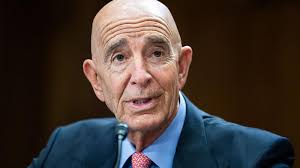Multifaceted American Mediation Between Syria, Israel, and Lebanon
August 24, 202591 ViewsRead Time: 3 minutes

Font Size
16
In an intensive diplomatic movement, the American special envoy to Syria, Tom Barrack, seems to be trying to extinguish multiple fires at the same time. His visit to Tel Aviv on Sunday, just days after his visit to Beirut, reveals a vigorous American effort to contain the escalation in the region by combining the Lebanese and Syrian files into an integrated strategy.
In a meeting with Israeli Prime Minister Benjamin Netanyahu, Barrack discussed halting attacks on Lebanon in reference to the repeated escalation across the Lebanese-Israeli border and the Syrian-Israeli negotiations as an attempt to achieve stability on the Syrian front.
The Israeli presence was notable, including ministers concerned with the Syrian and Lebanese files: Minister of Strategic Affairs Ron Dermer, Foreign Minister Gidon Sa'ar, and Defense Minister Israel Katz. This high-level ministerial representation underscores the importance of the two files for Israel.
In Beirut, Barrack was clear in his statement: "The Lebanese government took the first step by agreeing to disarm Hezbollah; now Israel must take a step in return." This phrase indicates that Washington wants Israel to make concessions in exchange for progress on the disarmament of the party, which is Israel's biggest concern in the north.
The trilateral meeting in Paris between Syrian Foreign Minister Asaad al-Shibani, Intelligence Chief Hussein Salama, and Israeli Affairs Minister Ron Dermer (under American sponsorship) reveals:
Focus on the humanitarian aspect: agreement to "intensify aid to the people of Sweida and the Bedouins" to improve living conditions.
Reactivation of the 1974 agreement: seeking a mechanism to stop Israeli incursions in southern Syria.
Repeated meetings: this is the second meeting in weeks, confirming the existence of a continuous communication channel.
This intensive American diplomatic movement comes amid:
Escalation in southern Syria: especially in Sweida, which is witnessing rising security tensions.
American elections: the Biden administration's desire to present diplomatic achievements before November.
Israeli concerns: about the northern front (Lebanon and Syria) turning into an open front.
Despite these efforts, the road to any real agreement is fraught with obstacles:
Hezbollah: refuses to hand over its weapons, considering them legitimate resistance weapons. Syrian-Israeli disagreements: are deep and relate to the Golan and sovereignty. The internal Israeli situation: the fragile coalition government may hinder bold decision-making.
The American mediation is trying to take advantage of a rare moment of relative openness between the parties, but the gaps remain enormous. Success will depend on Barrack's ability to convince Israel to make tangible concessions, ensure Syria's commitment to calming the front, and persuade Hezbollah that Lebanese interests require avoiding entering a new war. The equation is difficult, but failure could mean a return of the region to a state of escalation.
In a meeting with Israeli Prime Minister Benjamin Netanyahu, Barrack discussed halting attacks on Lebanon in reference to the repeated escalation across the Lebanese-Israeli border and the Syrian-Israeli negotiations as an attempt to achieve stability on the Syrian front.
The Israeli presence was notable, including ministers concerned with the Syrian and Lebanese files: Minister of Strategic Affairs Ron Dermer, Foreign Minister Gidon Sa'ar, and Defense Minister Israel Katz. This high-level ministerial representation underscores the importance of the two files for Israel.
In Beirut, Barrack was clear in his statement: "The Lebanese government took the first step by agreeing to disarm Hezbollah; now Israel must take a step in return." This phrase indicates that Washington wants Israel to make concessions in exchange for progress on the disarmament of the party, which is Israel's biggest concern in the north.
The trilateral meeting in Paris between Syrian Foreign Minister Asaad al-Shibani, Intelligence Chief Hussein Salama, and Israeli Affairs Minister Ron Dermer (under American sponsorship) reveals:
Focus on the humanitarian aspect: agreement to "intensify aid to the people of Sweida and the Bedouins" to improve living conditions.
Reactivation of the 1974 agreement: seeking a mechanism to stop Israeli incursions in southern Syria.
Repeated meetings: this is the second meeting in weeks, confirming the existence of a continuous communication channel.
This intensive American diplomatic movement comes amid:
Escalation in southern Syria: especially in Sweida, which is witnessing rising security tensions.
American elections: the Biden administration's desire to present diplomatic achievements before November.
Israeli concerns: about the northern front (Lebanon and Syria) turning into an open front.
Despite these efforts, the road to any real agreement is fraught with obstacles:
Hezbollah: refuses to hand over its weapons, considering them legitimate resistance weapons. Syrian-Israeli disagreements: are deep and relate to the Golan and sovereignty. The internal Israeli situation: the fragile coalition government may hinder bold decision-making.
The American mediation is trying to take advantage of a rare moment of relative openness between the parties, but the gaps remain enormous. Success will depend on Barrack's ability to convince Israel to make tangible concessions, ensure Syria's commitment to calming the front, and persuade Hezbollah that Lebanese interests require avoiding entering a new war. The equation is difficult, but failure could mean a return of the region to a state of escalation.